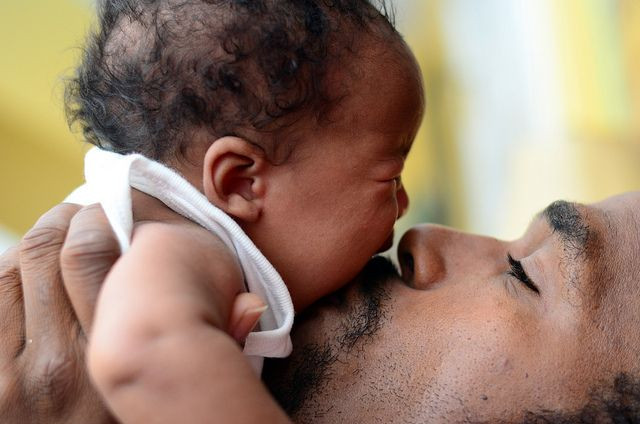Dads' Testosterone Levels Decline After Seeing Their Babies In Distress: Do Hormones Make A Man A Father?

What makes a father Daddy? A new University of Michigan study suggests how sensitive a father is may depend on his hormones: Seeing their 12-month-old infants in distress, dads' testosterone levels generally declined, the researchers discovered, yet most fathers' hormone levels remained steady when teaching their babies a simple task.
A man's sensitivity may depend, in part, on his hormones, yet his relationship with the mother, his natural empathy, and the gender of the baby also mattered. Girl babies received more gentle nurturing than boys, the researchers found.
“Sex-typed behavior toward infants tends to operate subconsciously, so fathers may be unaware that they are less sensitive toward boys,” wrote the authors.
Caregiving Dads
An increasing number of primary care givers are fathers with working wives, according to the United States Census Bureau. For fathers of preschool-age children, one in five is the primary caregiver — their child spent more time in their care than in any other care-giving arrangement during 2011. And, nearly 32 percent of fathers regularly provided care for their children age 15 or younger during 2011 compared to 26 percent in 2002.
Interestingly, fathers show greater brain activity when hearing their babies cry compared to hearing their babies laugh, the researchers said, yet with non-parents, the response is the exact opposite. This suggests fathers experience strong physiological changes whenever they see their infants in distress. Might one of these physiological changes be hormonal?
“Men’s testosterone (T) has been proposed as a potential biological contributor to paternal involvement,” wrote the researchers.
In fact, past studies have come up with mixed results when measuring T levels in fathers. Notably, though, results from the Vietnam Experience Study, which included 4,462 male army veterans, suggest the presence of children in the house increases testosterone levels in young married men (ages 30 to 35). For men in their 40s, those with no children have insignificantly lower average testosterone than men with children at home, the same study proved. So the question remains: Do testosterone levels contribute in some way to a father’s nurturing abilities?
A team of researchers, led by Dr. Brenda Volling, professor of psychology, explored fathers’ T levels in two distinct contexts. Their study included 175 men whose partner was pregnant with a second child. To measure T levels, the researchers collected saliva samples at key moments during the study.
First, the researchers separated the children from their fathers for a short period and then later reunited them. During the separation, fathers were able to watch their infants as they became visibly upset. On average, T levels in the fathers declined. This may be a response to witnessing their infants in distress, the researchers noted. Next, the fathers were asked to teach their infants separate tasks with different toys. During this exercise, T levels in the men generally remained steady.
According to the researchers, specific factors forecast whether or not a father would be a gentle nurturer of his child. Importantly, T reactivity during the earlier distress test predicted a father’s sensitivity, yet other factors also influenced a dad's response.
“Fathers’ love for their spouses positively predicted their sensitive parenting behaviors,” wrote the researchers, and “fathers of daughters were more sensitively engaged than fathers of sons.” Additionally, a man's intrinsic empathy also figured into the equation.
While the researchers believe their study has “implications for understanding how fathers can contribute to their children’s socioemotional development,” the take-away for most of us is much more simple. While dads often act differently than moms, they matter just as much.
Source: Kuo PX, Saini EK, Thomason E, et al. Individual variation in fathers’ testosterone reactivity to infant distress predicts parenting behaviors with their 1-year-old infants. Developmental Psychobiology. 2015.



























